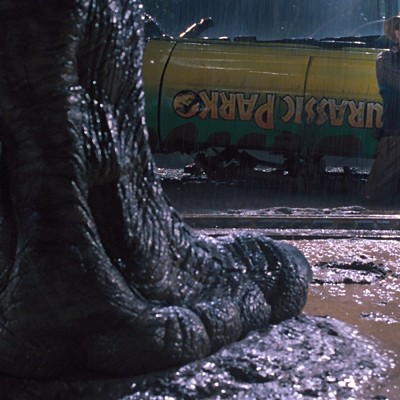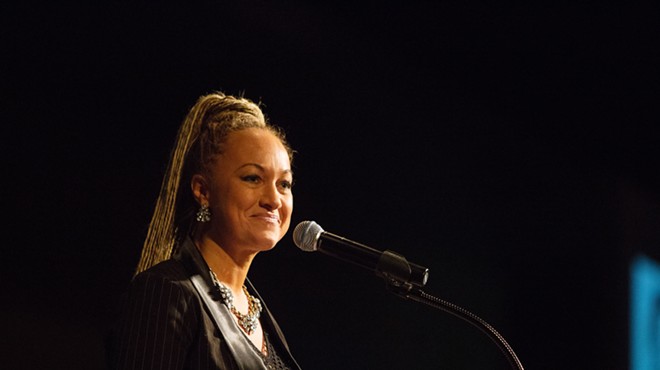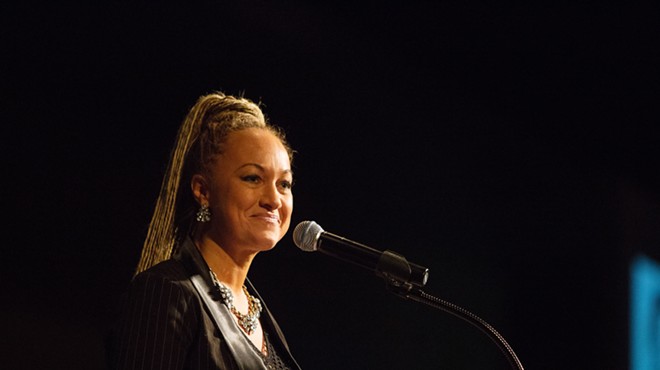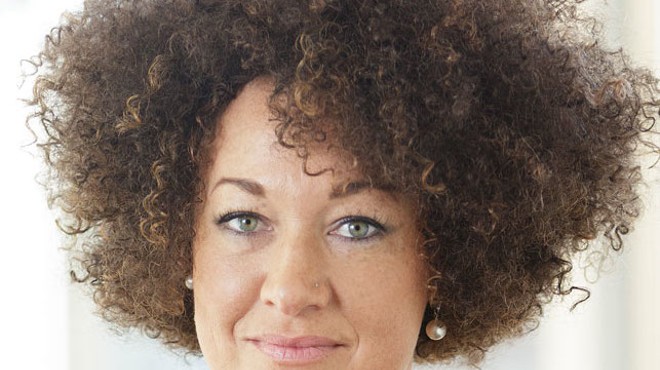Monday, June 15, 2015
WATCH: An EWU student's art project provides the most illuminating Rachel Dolezal interview yet
When recent Eastern Washington graduate Lauren Campbell started working on her year-long thesis — an exhibition for her visual communications and design major — she decided to create "kinetic pictography," using the words and images of local black women talking about what it means to be a black woman.
A black woman herself, Campbell had just begun to grapple with race on the very white Eastern Washington University campus and was interested in how others experienced it.
And as she looked for people to feature, faculty members kept recommending one name: Rachel Dolezal.
"All through my academic career I had been recommend to talk to her," Cambpell says. She sent Dolezal an email, and Dolezal agreed to talk.
But even back then, Campbell says, something seemed off.
"I didn’t invite her to my exhibition opening," Campbell says. "It just felt like the interactions felt weird. It felt like something’s wrong here, like something is weird about the information she is telling me.
"I specifically remember... we had this banquet, and they had invited her, and she was wearing this straight weave. That was the moment when I said, 'She does not have a single black feature,'" Campbell says. "When she wears her hair straight, I was like, how, that is Rachel Dolezal?"
But the prospect of making an accusation for her suspicions carried a lot of weight.
"What right do you have to say, 'Oh, you’re not black?'" Campbell says.
When all the accusations came out about Dolezal, "it was just like wow, that is some crazy stuff," she says.
That's when she uploaded all her interviews with Dolezal on YouTube. No matter the truth of Dolezal's statements, the insight to be gleaned is immense. This is how, when asked what it means to be a black woman, Dolezal responded:
Rachel Dolezal says it was the public that changed their own perception of how she was perceived
Dolezal first gained prominence in the local media as the victim of alleged hate crimes. And as those hate crimes appeared to escalate, Dolezal said, the media treated her differently — at first they referred to her as being from a transracial family, then as biracial, then finally as a "dark-skinned black woman." (Color Lines' research could not find confirmation she was ever portrayed by the media as "dark-skinned.")
Here, according to a family photo, is what she looked like as a young child.
Rachel Dolezal says it's tough to have to feel like you're representing an entire race.
"She talked about her ex-husband and her abuse," Campbell says. "The way she explained it, was that she had to ascribe to Eurocentric beauty standards. She was presenting herself as a white person because of her husband’s expectations."
As of Friday, Dolezal was no longer employed at EWU, due to the scheduled expiration of her contract.
“By contract, her part-time teaching position at Eastern Washington University Africana education program, ended Friday June 12, 2015,” says Dave Meany, spokesman for EWU. He does not have information on the possibility of future employment.
A black woman herself, Campbell had just begun to grapple with race on the very white Eastern Washington University campus and was interested in how others experienced it.
And as she looked for people to feature, faculty members kept recommending one name: Rachel Dolezal.
"All through my academic career I had been recommend to talk to her," Cambpell says. She sent Dolezal an email, and Dolezal agreed to talk.
But even back then, Campbell says, something seemed off.
"I didn’t invite her to my exhibition opening," Campbell says. "It just felt like the interactions felt weird. It felt like something’s wrong here, like something is weird about the information she is telling me.
"I specifically remember... we had this banquet, and they had invited her, and she was wearing this straight weave. That was the moment when I said, 'She does not have a single black feature,'" Campbell says. "When she wears her hair straight, I was like, how, that is Rachel Dolezal?"
But the prospect of making an accusation for her suspicions carried a lot of weight.
"What right do you have to say, 'Oh, you’re not black?'" Campbell says.
When all the accusations came out about Dolezal, "it was just like wow, that is some crazy stuff," she says.
That's when she uploaded all her interviews with Dolezal on YouTube. No matter the truth of Dolezal's statements, the insight to be gleaned is immense. This is how, when asked what it means to be a black woman, Dolezal responded:
Rachel Dolezal says it was the public that changed their own perception of how she was perceived
Dolezal first gained prominence in the local media as the victim of alleged hate crimes. And as those hate crimes appeared to escalate, Dolezal said, the media treated her differently — at first they referred to her as being from a transracial family, then as biracial, then finally as a "dark-skinned black woman." (Color Lines' research could not find confirmation she was ever portrayed by the media as "dark-skinned.")
The more white supremacy groups did to me and my family, the darker my complexion became in the public’s eyes, without even seeing me. It’s like, 'Oh, she got blacker and blacker and blacker…' Now, the the audience is deciding, reframing my identity.Rachel Dolezal says she drew a self-portrait of herself with a "brown" crayon in kindergarten, and the teacher said she was using the wrong color
... It’s a little bit odd, to have other people’s actions and counter actions, keep shaping and reframing your own identity. I think that probably happens often for all of us.
Somebody would be, 'Oh, you’re not black.' So what do you do? 'Or you’re mixed, or you might be white…'
I remember, my first portrait that I drew of myself, in kindergarten … All of my portraits were the brown crayon. Brown crayon, black hair, you know. With braids, or curls or whatever. And the teacher taking the brown crayon away, and the teacher saying, 'you need to use the peach crayon.' And me being like, really confused by that. You know, in my mind, it was either, brown or peach.
The boxes of crayon then — I was born in the '70s — were not very diverse on skin color. I remember having anxiety on whether I was going to choose peach or brown, peach or brown. And that being something that created tension. And also holding up the crayons on my own skin, and: 'What am I?'
Here, according to a family photo, is what she looked like as a young child.
Rachel Dolezal says it's tough to have to feel like you're representing an entire race.
It’s fairly normal to not like to have to be the voice for an entire group, because that’s not liberating that’s confining. Especially in an area like Spokane or North Idaho, where it’s a majority white audience, it’s very difficult to have that burden on a daily basis… oh, well, what do you do with their hair? Then you get the sense that they are then assuming that every other black woman will do those things too.Rachel Dolezal critiques feminism for not dealing more with race
...
I lived in Mississippi for four years or almost five. You know, if you’re living inside an all-black community, then you understand. There’s more freedom to just be you. If you go to store in your slippers, it’s not a big deal…
Race, class and gender are always intertwined, from everything I do. Those three are the top considerations. What happens to you based on being a woman, and being a black woman, and being a low-wage worker or a high-class person or whatever, will always impact everything in your life. You can’t just isolate and just be this one thing for somebody and ignore these other aspects of their identity. Women’s study programs are, by I think 94 percent, run by white women.Rachel Dolezal says her "light-skin privilege" made it easier for white people to approach her — and let her correct them
…
Feminism in general was always women’s rights, women’s liberation, without pulling in the Alice Walker model of Womanism, with race, class and gender considerations. With some of those cases I feel like I’m a bridge, but that also makes my experience a little bit more isolated, and a little bit more lonely.
…
I think sometimes I can play different roles in that process, that are helpful in that moment, but not all of those roles are typically played by all my friends and colleagues. Okay, you understand this one part of me, but you don’t really get the other pieces of the story. But that’s alright.
Because I am very light-skinned, I think there’s a certain light-skinned privilege that I’ve noticed, with just again, in terms of bringing sides together. So that I feel that some white people approach me as a safe person to talk to, about how maybe they can glean some ideas, like, oh would this be okay?"
Rachel Dolezal critiques the way that white culture has "co-opted" black culture.
Even on campus, a white professor's asking, 'Oh if we did this with a certain event, would this be okay?'
...
It's also a little bit of burden to be that bridge. I do feel like that's a real part in my experience. Where that breaks down a bit is I am very Afro-centric, and I am very direct personality-wise, and I will say exactly what I think is right at that moment.
I had a student in Eastern one time tell me, ‘It’s so awesome that black people are good at sports and are good at music and stuff, and white people aren’t good at anything. What are we known for? We're not known for anything.' My response is, 'huh? You’re known for everything, because you’re allowed to do everything…'After the recording, Campbell says, Dolezal discussed why she had portrayed herself as "white" for years before portraying herself as "black."
“There’s this co-opting of all kinds of cultures, so you have an Eminem rapping, and Justin Bieber, heavily influenced by pop, which goes back to soul, and gospel and spirituals. The whole black music that has been created by black people has influenced every genre of American music. But a lot of people are like, it’s just 'rap' or 'thug' music or whatever.
"She talked about her ex-husband and her abuse," Campbell says. "The way she explained it, was that she had to ascribe to Eurocentric beauty standards. She was presenting herself as a white person because of her husband’s expectations."
As of Friday, Dolezal was no longer employed at EWU, due to the scheduled expiration of her contract.
“By contract, her part-time teaching position at Eastern Washington University Africana education program, ended Friday June 12, 2015,” says Dave Meany, spokesman for EWU. He does not have information on the possibility of future employment.
Tags: Rachel Dolezal , race , News , Image , Video




























